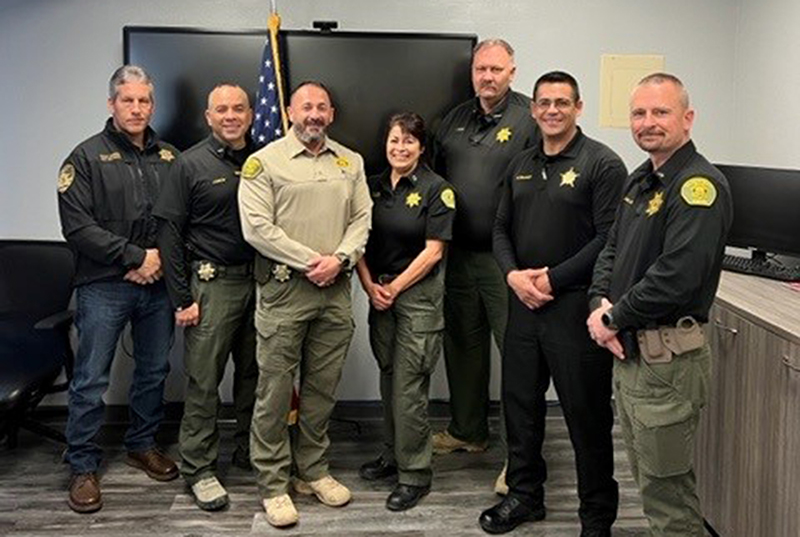The Valencia County Sheriff’s Office achieved a first recently — receiving a three-year certificate of accreditation from the New Mexico Sheriff’s Professional Standards Council.
The accreditation program is a joint initiative between New Mexico Counties and the NMSPSC formed in 2021. The purpose is to enhance the professionalism, uniformity and consistency in the operation of sheriff’s offices in New Mexico.
There are more than 190 standards that must be followed with policy, procedure and documentation, including observed practices.
The accreditation, through the council, continues a tradition begun by the department in 2015, as the only sheriff’s office accredited by the New Mexico Municipal League.

Submitted photo
Pictured are two members of the New Mexico Sheriff’s Professional Standards Council assessment team and members of the Valencia County Sheriff’s Office. The office was recently announced as the first in the state to earn accreditation from the council. From left are, Lea County Sheriff’s Chief Deputy Jon Martinez, Valencia County Sheriff’s Chief Deputy John Giron, VCSO Lt. Pete Alderete, Valencia County Sheriff Denise Vigil, VCSO Undersheriff Jeff Noah, Santa Fe County Sheriff’s Lt. Michael Delgado and VCSO Lt. Joseph Rowland.
Valencia County Sheriff Denise Vigil said while being accredited through the league was an accomplishment, it wasn’t an ideal match since that organization’s standards mainly focused on municipal law enforcement departments.
“Some of their standards didn’t apply. For instance, most sheriff’s offices don’t have control over their jails. The league hit a speed bump in their ability to keep an accreditation team together, so we decided to not wait and see how they were going to proceed,” Vigil said.
In creating the standards for the NMSPSC, standards that pertained to jails and dispatch centers were separated so those facilities could pursue their own accreditations, Vigil said.
To meet the standards and become the first sheriff’s office in the state to earn the council accreditation was a lot of administrative work and review, headed up by Lt. Pete Alderete, the sheriff said.
“This all comes down to our directives, policies and procedures, and we can’t just say we’re following our policies and directives. We have to have proof,” Vigil said. “We have to provide reports that show the deputies are following our polices.
“For instance, when they handcuff a suspect, they can’t just clamp them on and say it’s good. They have to have double spacing, and they have to document that every time, in every report. If it’s a use of force, they have to describe how they held the person’s wrist and got them into the cuffs while they were resisting.
“It’s time consuming but worth it. We have to make sure we have a standard in how we treat the public and our directives ensure our deputies are doing the right things out there.”
After eight months of paper cuts and a copious amount of time scanning reports, Alderete said while he is proud of what he helped the department accomplish, he’s also glad it’s over and done with.
The on-site assessment of the department was completed in late March, with the council voting to confirm the accreditation in April.
“It was a lot to do and I still had my other work to do, running backgrounds, physical testing, doing training,” Alderete said.
The purpose of the accreditation is to ensure the department has the best policies and standardized practises in law enforcement that are approved and accredited through the standards board.
“It’s a standard of excellence. It shows our policies are up to date and meet the threshold that is set,” the lieutenant said. “We’re the only agency that has been able to do that time after time.”
Alderete continued, saying any agency can meet the benchmarks for accreditation but it’s a lot of work, especially for large departments.
Departments have to demonstrate and prove it is meeting standards in areas such as evidence collection, storing and purging, patrol procedure, SWAT protocol, investigations, specialty units, traffic stops, record keeping and management, the handling of ammunition and firearms and more.
“All of this helps us keep our insurance rates low, on the risk management side of things,” he said. “I am proud to be a part of it, but I’m glad it’s over. Other agencies are closing in on it and should have it by year end.”
Julia M. Dendinger began working at the VCNB in 2006. She covers Valencia County government, Belen Consolidated Schools and the village of Bosque Farms. She is a member of the Society of Professional Journalists Rio Grande chapter’s board of directors.

















